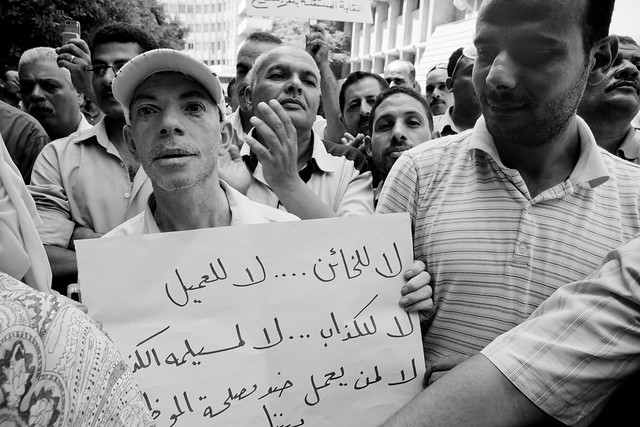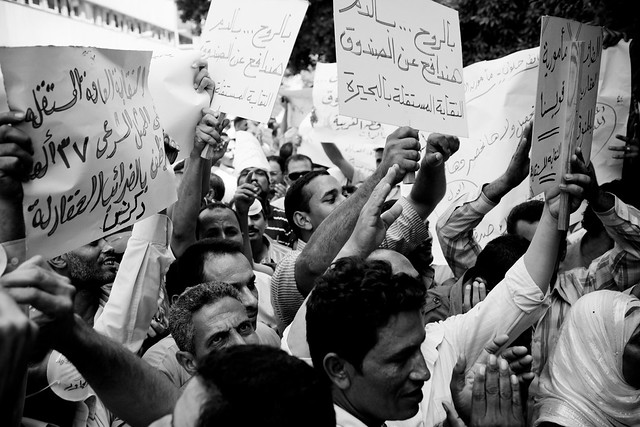Real Estate Tax Collectors demonstrating Tuesday against the state-backed General Federation of Trade Unions, Hussein Hegazi Street, Downtown Cairo.
Tag: state backed unions
Tax Collector
Real Estate Tax Collectors demonstrating against the state-backed General Federation of Trade Unions, Hussein Hegazi Street, Downtown Cairo.
Egypt’s tax collectors on STRIKE
My report for Al-Masry Al-Youm:
More than 1000 property tax collectors are staging a sit-in, downtown Cairo, demanding job reforms and a halt to what they called a crackdown on their independent union.
Protesters—wearing facial “swine flu masks,” with the words “Independent Union” written on them—are accusing Finance Minister Youssef Boutross Ghali of “betraying” a deal struck with the independent representatives over a social welfare fund on 28 July, by which every retired tax collector would have received a 110-month pay.
“After issuing a Ministerial Decree, documented in the official state organ, the minister ‘readjusted’ his decree and gave the project to the government union,” Tarek Mostafa, a Qalyoubia tax collector and the independent union’s treasurer, said bitterly. “We are here today to make the whole world know we are against this, and will fight till the last breath to defend our children’s money,” continued Mostafa as he tried with difficulty to move between the crowd in Hussein Hegazi Street, facing the ministerial cabinet headquarters.
At least five Central Security Forces trucks have arrived quickly in the scene, with black-uniformed soldiers in full gear, forming a cordon around the protesters, but no clashes are reported. Plainclothes security informers could be spotted on both ends of street.
Abdel Qader Nada, one of the Giza tax collectors and independent union leaders, shouted: “we will not be afraid! We will not hide behind walls. This is our (social welfare) fund! This is our union!” The crowd roared, as they started beating the drums. “Are we willing to stay here (in Hussein Hegazi St.) for a year?” The crowd answered: “Yes!”
“What does the government need more to recognize who are the true representatives of the civil servants?” exclaimed Kamal Abu Eita, a Giza tax collector and the charismatic president of the independent union. “We slept in the street for 11 days to get our rights in 2007. We are prepared to do it again.”
Abu Eita, carried on the shoulders, grabbed the microphone, and started to lead the chants. The lion share of the demonstrators’ wrath fell upon Hussein Megawer, a senior parliamentarian with the ruling National Democratic Party and the president of the state-backed General Federation of Trade Unions.
The civil servants are part of the 55,000-strong Egypt’s Real Estate Tax Authority employees, who have already started a national strike today. In addition to the fight over the social welfare fund, the strikers are also demanding a three-month pay of incentives, transportation allowance, and a halt to the crackdown on the independent union activists in Giza and the provinces.
The current strike is the latest round in an ongoing battle over trade union rights in the country. Since December 2006, Egypt has been witnessing the strongest wave of labor strikes since 1946. The strikes were met with hostility from the state-backed General Federation of Trade Unions, triggering a campaign by strike leaders in different sectors to either impeach the government union officials, or launch a parallel independent union. The first to achieve that were the tax collectors, who struck for three months in the fall of 2007, occupying Hussein Hegazi Street for 12 days. Their strike resulted in a 325% increase in their relatively low salaries, and the unofficial strike leadership went on to found the country’s first independent trade union since 1957.
“We are left with no other choice but to strike,” Gamal Ouweida, a tax collector from the Daqahliya province, said. “You don’t know what they are doing to us. The government is using provocateurs and traitors from the state union to divide our ranks, smear us, defame us, and fabricate charges against us. Enough is Enough.”
Relations between the independent union and the state-backed Federation have been tense. The latter has incited, according to the independent trade unionists, a government-led campaign of witch-hunt, and in cases like in the Gharbeia and Sharqiya Nile Delta provinces as well as in the Upper Egyptian province of Bani Sweif, physical fights already broke out between the government union officials and the independent union activists.
Today’s protesters carried banners describing the head of the General Federation of Trade Unions and Farouk Shehata, the head of the state-backed General Union of Bank, Insurance and Finance Workers, as “thieves.”
Said Ahmad Mukhtar, a young Cairo tax collector: “The government knows we are a threat to its (General) Federation. They want to crush us and crush anyone who wants to defend the workers’ rights.”
There was strong participation of women in the protest, just like the 2007 strike. Many, veiled and some in Niqab, have already left their families behind in the provinces to come join the occupation. Others like Cairo Tax Collector Madeeha, brought “my two children with me today. They should know their mother sweats in order to bring food on their table,” she said as she was adjusting the facial mask on one of her kids’.
“Down with Megawer! Down with Farouk!” chanted a group of women tax collectors, who stood together holding a banner that reads “The Independent Union – Alexandria.”
While their strike continues nationally, the downtown protesters are expected to vote by 6pm on whether to continue the Hussein Hegazi Street sit-in or not.



